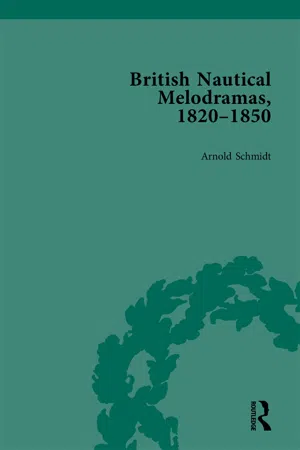
- 418 pages
- English
- ePUB (mobile friendly)
- Available on iOS & Android
About This Book
During the 1820s and 30s nautical melodramas "reigned supreme" on London stages, entertaining the mariners and maritime workers who comprised a large part of the audience for small theatres with the same sentimental moments and comic interludes of domestic melodrama mixed with patriotic images that communicated and reinforced imperial themes. However, generally the study of British theatre history moves from medieval and renaissance plays directly to the realism and naturalism of late Victorian and modern drama. Readers typically encounter a gap between Restoration and eighteenth-century plays like those of Oliver Goldsmith and Richard Brinsley Sheridan, and late-nineteenth plays by Henrik Ibsen and Oscar Wilde. Nineteenth-century drama, with the possible exception of plays by Byron, Shelley, and Wordsworth, remains all but invisible. Until recently, melodramatic plays written and performed during this "gap" received little scholarly attention, but their value as reflections of Britain's promulgation of imperial ideology — and its role in constructing and maintaining class, gender, and racial identities — have given discussions of melodrama force and momentum.
The plays in included in these three volumes have never appeared in a critical anthology and most have not been republished since their original nineteenth-century editions. Each play is transcribed from the original documents and includes an author biography, a headnote about the play itself, full annotations with brief definitions of unfamiliar vocabulary, and explanatory notes. Comprehensive editorial apparatus details the nineteenth-century imperial, naval, political, and social history relevant to the plays' nautical themes, as well as discussing nineteenth-century theatre history, melodrama generally, and the nautical melodrama in particular. Contemporary theatre practices — acting, audiences, staging, lighting, special effects — are also examined. An extensive bibliography of primary and secondary texts; a complete index; and contemporary images of the actors, theatres, stage sets, playbills, costumes, and locales have been compiled to aid study further. The appendices include maps of Britain, Europe, and the East and West Indies.
Frequently asked questions
Information
Table of contents
- Cover
- Half Title
- Title
- Copyright
- Dedication
- Contents
- List of images
- Acknowledgements
- Abbreviations
- Editorial policies
- Glossary
- Notable theatres and people
- Bibliography
- General introduction
- Volume I Plays